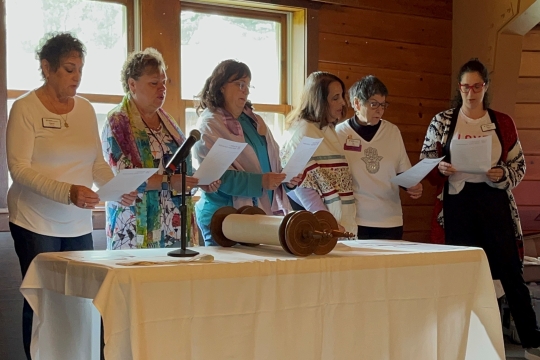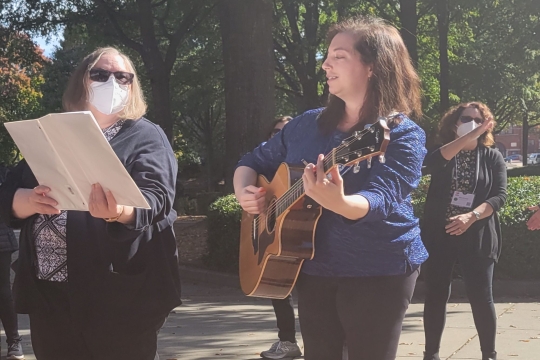
Parashat Ki Tisa offers multiple opportunities to reflect on its implications for our current situations. When we remember that Moses ascends Mt. Sinai to receive the commandments and is away from the Israelites for forty days, the people are wandering and processing their departure from the terrible days of slavery in Egypt. They struggle with fear and anxiety. They have multiple concerns and truly rely upon their leader.
There were tasks to accomplish: they were expected to take a census and levy a tax on the people. Counting their male numbers and raising the funds needed to coordinate their society seemed to be too difficult to accomplish, especially during Moses’ absence.
Aaron assumes a leadership role in this stressful time. The people rebel, and refute the commitments they have made to G-d by creating a golden calf from the riches they brought out of Egypt, instead of creating the tabernacle and the basin for anointing the priests, utilizing the skills of artisans like Bezalel. They seem to lose sight of the covenant with G-d to keep the Sabbath and worship the one G-d. They forget about building the tabernacle, fall back into idolatry, and remember their recent oppression. The Israelites struggle with their brokenness, anxieties, and the changes in their lives.
When Moses returns with the two tablets on which the Ten Commandments were inscribed, he is enraged at what he finds—his people gone amok—and smashes the tablets and burns the golden calf. Moses begs G-d not to destroy the people. He then re-ascends the mount for forty more days to receive a second set of commandments.
Aaron has learned a difficult lesson about leadership through this chaos. The Israelites reckon with their relationship with the G-d they cannot see. And, Moses also has struggles in his relationship with G-d. Holiness, spirituality, humanity, and even creativity in dealing with a new life factor into the development of the culture of the Israelites as they wander.
We know in our own lives the importance of leadership, collaboration, and structure, and what occurs when these essentials fall apart. There is distrust, crisis, and failure to communicate from the top down. Dealing with multiple changes and insecurity is exceedingly difficult, especially in new circumstances with little stability or predictability for the future. Self-government is a new concept that creates uncertainty, insecurity, and vulnerability. Leadership is a challenge. Responsibility suffers.
Yet, Parashat Ki Tisa is a story of evolution. The Israelites are learning to make each day count as a step in their new lives. Not only do they count days and time, but must learn to make each day count — for themselves and their community. The people must understand the need to communicate and want to be heard, too.
So, as we consider the concepts of leadership, responsibility, obligation and change in our own world, communities and individual lives, it is not too difficult to become aware that history can repeat itself…perhaps differently in terms of actualities. We are constantly aware that not much really changes over time. Circumstances may be a bit (or a lot) different, but there is always a need to observe, listen, hear, and be respectful, present, and open.
We are each responsible for our own conduct and for the potential of our words and actions as leaders in our women’s groups, congregations, communities, and, yes, in the world at large. We may not build golden calves as symbols of our rebellion, but we may step back or even disengage because of frustration or fear. Perhaps, we can consider as we celebrate Shabbat, our own roles. We can keep the Commandments carved in the two tablets. We can be examples that reflect our values and traditions. We can collaborate to ensure that what really matters is engaging together to move forward—remembering that each of us makes a difference. And, we are fortunate to have the opportunities to engage in the efforts of Women of Reform Judaism—now and moving forward.
Shabbat Shalom!
Related Posts

Parashat Yom Rishon shel Rosh HaShanah

Cultivating a Culture of Accountability and Belonging

